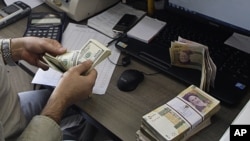The European Union's expulsion of 30 sanctioned Iranian banks from a global financial messaging service last month has made it significantly harder for Iranians using those banks to do business with foreign partners.
The head of the German-Iranian Chamber of Commerce in Hamburg, Michael Tockuss, said that hundreds of German exporters are owed $4.7 billion by Iranians who received goods before the EU move, but now cannot use their banks to pay for them.
His comments reflect Western contentions that a variety of mostly U.S. and European sanctions relating to Iran's controversial nuclear program are having crippling effects on the Iranian economy.
The Belgium-based organization SWIFT disconnected 30 Iranian banks from its network on March 17, on the orders of EU nations who sanctioned those banks for having links to Iran's nuclear program. The United States also has sanctions against 23 Iranian banks.
SWIFT is the world's dominant platform for cross-border financial transactions. Without access to it, EU-sanctioned Iranian banks cannot send money abroad electronically on behalf of clients or themselves.
Money transfers cut
The SWIFT cut-off not only is blocking existing deals between Iranian and European companies, but also prevents them from making any new agreements to transfer money via the 30 Iranian banks.
Several opportunities exist for Iranian businesses and their trade partners to continue legal transactions with each other.
Tockuss said Iran has five or six banks that are not under EU sanctions. Those banks remain connected to the SWIFT system and can be used by European companies exporting to Iranian markets.
But using that method is not easy, because many European banks refuse to accept money from any Iranian lenders, even those not under sanctions.
"This has nothing to do with the sanctions directly," said Tockuss. "It is a company decision to stop this business [with Iran]."
Many European banks also lack established relationships with the non-sanctioned Iranian banks, which are private, relatively young and have only a small market share.
Karim Pakravan, a finance professor at DePaul University of Chicago, said that any foreign banks opening accounts for Iran's small lenders are likely to limit their credit lines and charge them a premium for services.
"Pretty much the only way that Iranian banks can execute foreign transactions now is by allowing [Iranians] to buy cash, put it in a case, fly on a plane to wherever they have to go, and hand over the cash for whatever transaction they have," he said.
Cash transactions rise
Tockuss of the German-Iranian Chamber of Commerce said cash handovers by Iranians to European businesses "definitely have increased." But he said in most cases the payments do not exceed $60,000.
"I have not seen any Iranians traveling in the world with half a million euros at the moment," he said. "But smaller payments for spare parts or similar items are quite common."
Another legal avenue for Iran to engage in financial transactions with the West is by importing goods and services exempted from Western sanctions.
Items exempted by the Obama administration include food, medicine and communication equipment designed to help Iranians get better access to the Internet.
Even with such exemptions, Tockuss said the tightening of EU and U.S. sanctions on Iran has created another casualty: "the average Iranian on the street."
Tockuss said a German medical company that exports devices used by thousands of dialysis patients in Tehran recently had problems in finding a bank to handle Iranian payments. He said the problems were eventually resolved.
Wide impacts
Pakravan of DePaul University said Western sanctions on Iran's banking sector have had other economic impacts.
"Factories cannot find raw materials and spare parts, and have stopped operating," he said. "The Iranian market also has been invaded by much cheaper Chinese goods and those will continue to undercut Iranian industry."
Iranian Foreign Minister Ali Akbar Salehi has downplayed the sanctions. In an interview with state news agency IRNA published on Monday, he called them "minor problems" and said "Iran is quite capable of defeating those pressures."
The Iranian government gets most of its revenue from oil and has signed barter agreements with major buyers such as India, bypassing the need to use the SWIFT financial messaging service.
Economist Intelligence Unit Middle East/North Africa editor Edward Bell, reached by phone in London, said the expulsion of Iranian banks from SWIFT "will not really affect Iran's oil sector much."
But Iran's government could see its fortunes decline if U.S. lawmakers succeed in passing a bill threatening SWIFT with penalties unless it expels all Iranian banks. "If that happens, anybody trying to do any trade with Iran is going to face a real difficulty," Bell said.
Bell also said EU sanctions against Iran are likely to tighten even further. "I think you will see a more coordinated and consistent EU policy on Iran as being more tough and similar to the United States," he said.
| Join the conversation on our social journalism site - Middle East Voices. Follow our Middle East reports on Twitter and discuss them on our Facebook page. |




